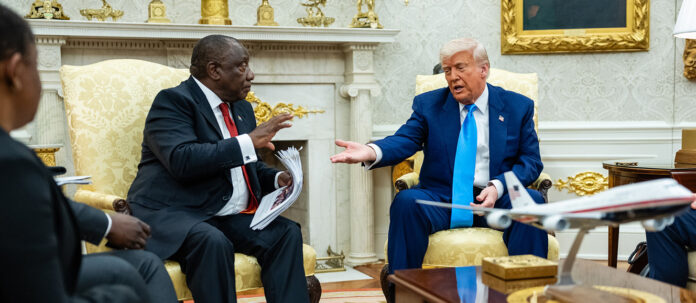US President Donald Trump and President Cyril Ramaphosa spoke over the phone about the 30% goods trade tariff.
Vincent Magwenya, the president’s spokesperson, confirmed the telephone discussion as the tariff increase goes into effect today.
“The two leaders undertook to continue with further engagements, recognising the various trade negotiations the US is currently involved in,” said Magwenya.
“Respective trade negotiation teams will take forward more detailed discussions.”
Demand-side interventions
Khumbudzo Ntshavheni, the Minister in the Presidency, stated that Cabinet had been updated on the framework deal with the US and reiterated its dedication to identifying positive and sustainable solutions.
Ntshavheni confirmed that engagements between the two countries are continuing at all levels, including heads of state.
“The government’s efforts remain focused on growing the economy to save and create new jobs, which include intensifying diversification efforts and strengthening their global supply chain integration as the country works to expand its export markets to Asia, Europe, the Middle East, and across Africa to enhance our economic resilience,” said Ntshavheni.
“Specific to industries impacted by the tariff increase, the government is focusing on demand-side interventions in the impacted industries and targeted interventions to ensure industry stability and safeguard employment.”
Block exemption for exporters
The series of interventions to support industries that have been hit hardest by the new tariffs includes the establishment of an export support desk to assist affected companies directly, as well as a localisation support fund aimed at helping local businesses withstand the pressure.
In addition, the export and competitiveness support programme will offer financial relief through a working capital facility and funding for plants and equipment to help businesses maintain their operations in the short to medium term.
Ntshavheni said the government is also working closely with the Department of Employment and Labour to respond to possible job losses, using existing programmes that can be adapted to meet current needs.
“Following consultations with the Competition Commission, a block exemption for exporters has been introduced to enable collaboration and coordination by competitors.
“A draft block exemption will be published by the end of the week so that the process can be concluded expeditiously,” said Ntshavheni.



